How can you keep yourself and your family safe?published at 16:43 BST 28 September 2020
Step-by-step, what to do to help prevent the spread of the virus.
Read MoreBoris Johnson says coronavirus is "biggest threat [UK] has faced for decades"
New curbs on movement include shopping only for basic goods and a ban on gatherings
Police will be given powers to enforce restrictions, including by fines
The coronavirus pandemic is "accelerating", the World Health Organization warns
350,000 confirmed cases worldwide, with nearly 15,000 deaths and almost 100,000 people recovering
335 people with the virus have died in the UK
Italy deaths drop for second day in a row as it enters tougher lockdown
Death toll in Spain passes 2,000
David Walker, Yvette Tan, Andreas Illmer and Saira Asher
Step-by-step, what to do to help prevent the spread of the virus.
Read MoreWe're going to keep bringing you all the latest updates from around the world but as the new day starts in the UK our London colleagues will join us and we'll be posting the latest on this page here. Please do follow us there.
As a goodbye from us here's a reminder of where to find the most accurate and up-to-date information on how to protect yourself and your loved ones in these uncertain times.
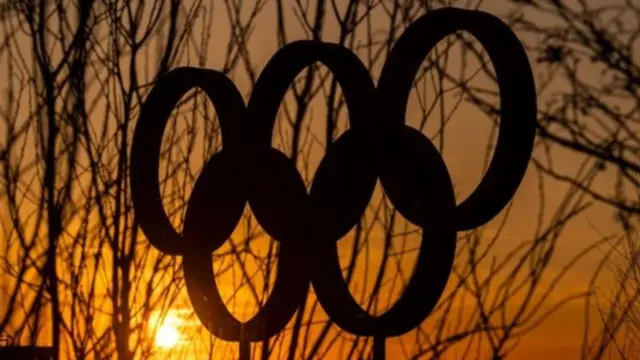 Image source, Getty Images
Image source, Getty ImagesAs uncertainty over the future of the Tokyo 2020 Olympics continues Japanese media are now reporting that Prime Minister Shinzo Abe will hold a phone call with Thomas Bach, head of the International Olympic Committee, at 8pm local time, 11GMT.
There's been mounting criticism over the IOC and Japan's insistence the Games will go ahead.
Many athletes and a number of national Olympic committees say it's impossible to train for the event and that it's extremely unlikely that the global pandemic will be under control by 24 July, the scheduled kick-off date for the Games.
Senate Democratic Leader Chuck Schumer and US Treasury Secretary Steven Mnuchin say they have not yet reached a deal on a $2 trillion (£1.7tn) coronavirus economic stimulus package, but progress has been made.
Mr Schumer said a vote on the deal in the US Senate could take place as early as Tuesday.
Democrats in the Republican-controlled chamber have complained that the package does not contain enough funding for states and hospitals. They also want more restrictions on a fund to help large businesses.
On the first day of a country-wide lockdown in India, hundreds were held for violating the curfew - and the police dealt out some fairly unusual forms of punishment in some states.
Local media reports showed videos of police in Punjab and Maharashtra punishing men who broke the curfew by forcing them to do push-ups, external.
In Rajasthan and Uttar Pradesh, police also took to shaming people on social media, external - they posted photos of the alleged violators, saying “they were against society as they will not stay at home”, reported the Hindustan Times.
Elsewhere, officials seized vehicles, external after questioning people where they were going to determine if it was essential for them to be outside their home.
States have also been asked to take legal action if necessary as many have imposed a colonial-era law that prohibits four or more people gathering.
Checks and fines are expected to increase on Tuesday as more cities and states go into lockdown to fight the spread of Covid-19 - India has reported 446 active cases, and nine deaths so far.
 Image source, Getty Images
Image source, Getty ImagesWe have important panda news to lighten your mood.
After 58 days of keeping visitors away, the Beijing Zoo reopened on Monday.
According to state media, the animals have been faring well during the virus lockdown, some of them seem to have enjoyed the quiet.
"Some of the animals, such as the pandas, preferred to have more exercise when the zoo was empty," the China Daily cites zoo director Zhang Chenglin.
He also says the area is still being disinfected on a regular basis.
For those who can't come down in person to see the animals, the zoo also has online tours where you can watch the animals being fed - or the enclosures being disinfected.
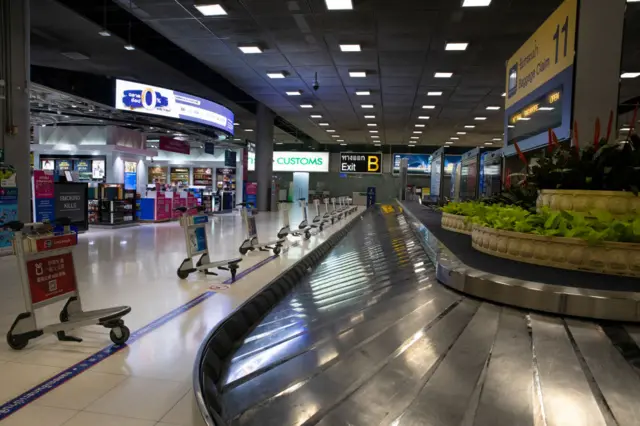 Image source, Getty Images
Image source, Getty ImagesThe Association of Asian Pacific Airlines (AAPA) has said its members need state support immediately as they face upwards of a $60bn revenue shortfall due to the coronavirus pandemic.
“The magnitude is beyond belief. It’s unimaginable,” APAA Director General Andrew Herdman told the BBC.
The trade group's member airlines include Singapore Airlines and Cathay Pacific among others.
He added that although carriers were cutting costs by slashing schedules, which saves on expenses like fuel, they continue to shoulder major overheads: "We’re still left with fixed costs including staff. The tough thing is that for a lot of staff, there’s no work for them to do.”
The AAPA is calling for government action in the form of deferred tax payments and extensions of interest-free loans to improve cash flow.
“The big focus is protecting the workforce. The airlines will need them once again once there’s a recovery. But when that will be, nobody knows,” Mr Herman concluded.
The gambling hub of Macau will ban all visitors from the Chinese mainland, Hong Kong and Taiwan who have travelled overseas in the past 14 days, said a Reuters report quoting its leader Ho Iat Seng.
It comes a week after it banned all foreign visitors from entering the region.
There are 25 confirmed cases of the virus in Macau - a once bustling casino hub which has now fallen silent amid virus fears.
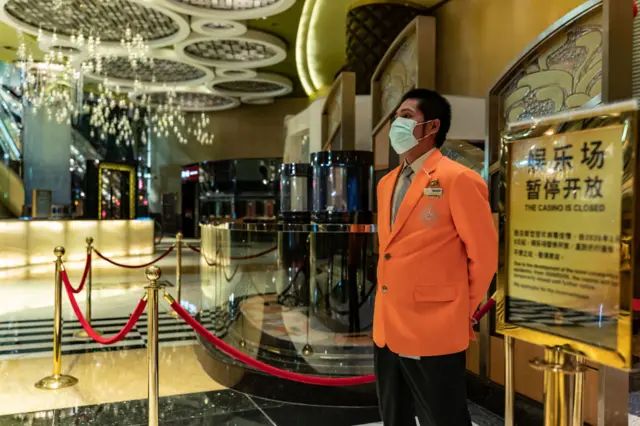 Image source, Getty Images
Image source, Getty ImagesMacau's once bustling casinos are now silent
Crime gangs in the Brazilian city of Rio de Janeiro are reported to have ordered curfews to combat coronavirus, saying they are taking action because the government refuses to.
Residents of several favelas (shanty towns) say they have received social media messages ordering people off the streets overnight.
"We want the best for the population. If the government doesn't have the capacity to do something [about coronavirus], then organised crime will sort it out," said one message reported by the G1 news website.
President Jair Bolsonaro has been criticised for his lacklustre response to the outbreak, prompting protests in São Paulo and Rio.
 Simon Atkinson
Simon Atkinson
BBC News, Sydney
For the past couple of hours I’ve been talking to Brits stuck in Australia and New Zealand. Several of them are health workers desperate to get back home to help out. For others, they have older relatives who they want to be near. And then there are the young travellers on working holiday visas who are losing their casual jobs and worry about being stuck far from home with no money and no support.
For many who’d already booked to get back, flights booked with airlines such as Emirates and Etihad are no longer flying. Planes going straight to the UK are few and far between and, of course, sold out.
The general feeling is helplessness. Being passed around by airlines and travel agents while struggling to get information from the British government. Everyone understands this is a global crisis. Nobody expects an easy answer. But the frustration seems to stem from being told get home as soon as possible – but finding it very hard to work out how to do that.
I’m told the British High Commission here in Australia will have some information soon. We’ll share that as soon as we get it.
Busy morning here in Singapore - where most of us are writing this live page from home - catching up on some major developments overnight.
The UK has told people to stay home, and we're checking in with our colleagues in London on how they and their families might be affected. The US reported more than 100 deaths in a single day and the WHO has warned that the pandemic is "accelerating".
Here are some updates from closer to home:
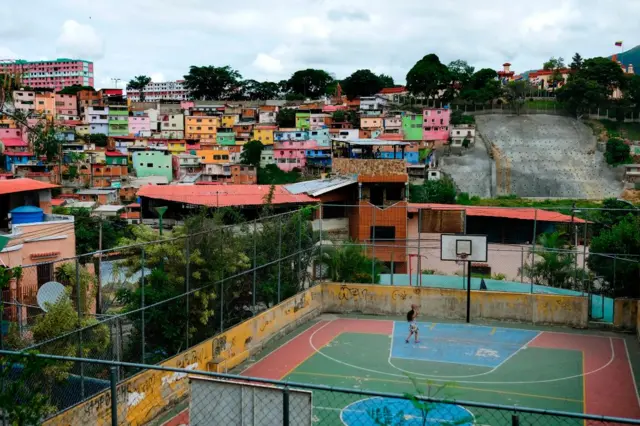 Image source, Getty Images
Image source, Getty ImagesThe 23 de Enero neighbourhood in Caracas has limited water supplies
There are major concerns over how Venezuela could deal with a coronavirus outbreak, as the South American country has long been in economic crisis, with regular food and medicine shortages.
The lockdown began on 17 March. All borders are shut and there are no flights in or out. People are only permitted to leave their house to buy food or medicines or attend medical appointments. They must wear a mask and, from Sunday, they also need to wear gloves.
William Bello, a concierge in his 50s from Caracas, told the BBC’s Guillermo Olmo about his concerns. Mr Bello lives in the 23 de Enero neighbourhood, which is working class and largely pro-government.
“People are very worried about the disease, so they are respecting the quarantine, but many street traders need to go out and sell stuff if they want something to eat. Police are everywhere and are ordering people to go home when they catch them.”
He typically gets running water only twice a week. This needs to be stored in containers and boiled before drinking. “With the water that we have, we’re trying to follow the recommendations and wash our hands frequently."
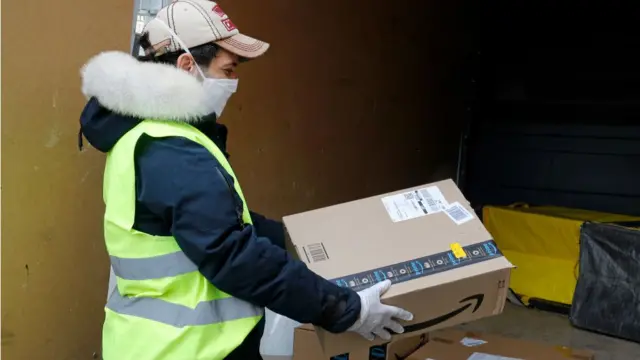 Image source, Getty Images
Image source, Getty ImagesAmazon is teaming up with researchers funded by Microsoft co-founder Bill Gates to pick up and deliver coronavirus test kits.
The Gates Foundation-backed Seattle Coronavirus Assessment Network (SCAN) is learning how the infection spreads.
It involves collecting nasal swabs to track the virus among residents of Seattle's King County in Washington.
Amazon Care, the retail giant's employee medical care arm, is now helping with deliveries of the kits.
King County is one of the places hardest hit by the outbreak in the US.
Online retail giant Amazon and Microsoft's Bill Gates are working together to track the outbreak's spread.
Read MoreFrances Mao
Sydney
As we mentioned earlier, one woman has died and over 50 cases have now been traced back to the Ruby Princess cruise ship, which docked in Sydney last Thursday.
Around 2,700 passengers were allowed to disembark then, despite authorities knowing that some on board were feeling unwell.
However this wasn't relayed to passengers, and by the time the first cases were revealed on Friday, some of those on board were half-way around the round.
Just how did Australian authorities get it so wrong in this instance? Read my full report into the debacle.
I spoke to one passenger, Elisa McCafferty, who has returned home to London with her husband but fears they both have the virus now.
"They shouldn't have let us disembark," she told me this morning.
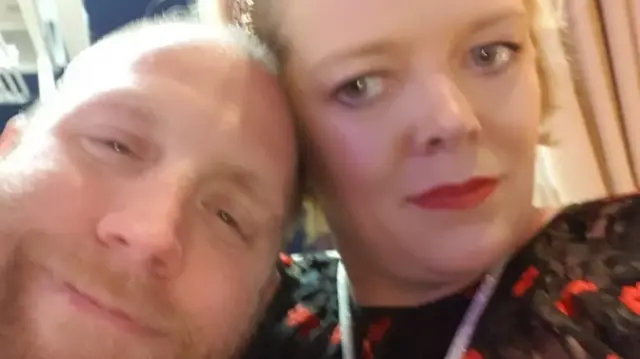 Image source, Elisa McCafferty
Image source, Elisa McCaffertyPassengers Elisa McCafferty and her husband are furious over the mishandling of the ship's return to Sydney
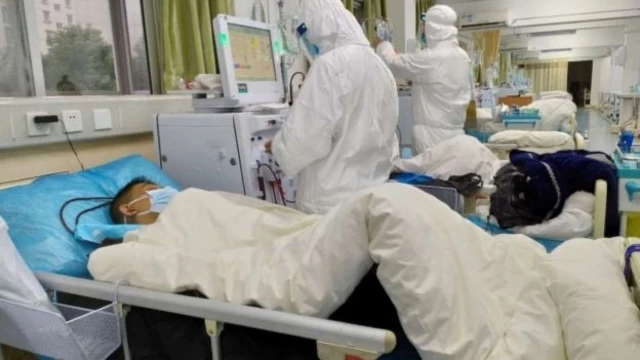 Image source, Reuters
Image source, ReutersWith domestic transmissions very low, China is focussing on people from overseas bringing the virus into the country. The city of Beijing has now tightened its rules on international arrivals even further, state media report.
Anyone entering the city from abroad will go into mandatory centralised quarantine for 14 days and will have to be tested for the coronavirus.
The report in the China Daily cited by Reuters also says that whoever enters the city from the rest of China and has travelled from overseas in the past two weeks will also have to be tested and quarantined.
China is where the global pandemic started and nearly 3,300 people have died from it there.
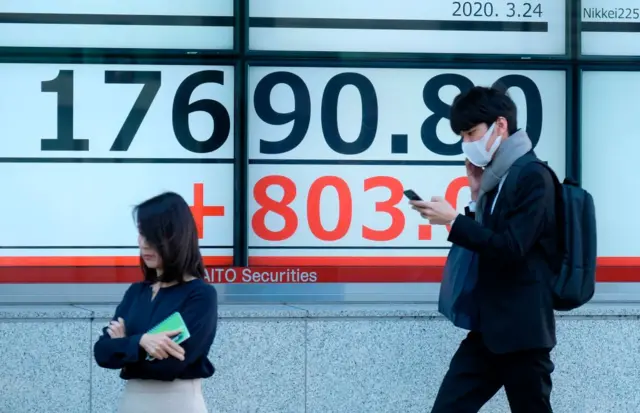 Image source, Getty Images
Image source, Getty ImagesAsian stocks have jumped after the US central bank rolled out a new plan to ease the economic impact of the coronavirus pandemic.
In its latest emergency measure, the Federal Reserve said it would buy unlimited amounts of assets to steady markets.
However, a US government bailout bill worth almost $2 trillion being debated in Congress has failed to advance for a second time, as Democrats said proposed financial relief for industries such as airlines would not do enough to help workers.
In morning trading Japan's benchmark Nikkei 225 was the 6.5% higher, the Hang Seng in Hong Kong gained 4%, and China's Shanghai Composite was up by 1.7%.
The US Embassy in Peru says it is working to bring its citizens home, after the South American country enforced a nationwide lockdown stranding thousands of people.
No flights are allowed to enter or leave the country without government permission.
The Charge d'Affaires Denison Offutt said the embassy was "actively coordinating with Peru on official repatriation flights for US citizens".
Mr Offutt says there are 5,000 US citizens currently in Peru - though he doesn't say how many are tourists or residents.
The comments section of the video however, are filled with comments by people claiming to be stranded US citizens in Peru.
"We are 12 family members stranded," says one comment.
"I'm still waiting in Magdalena Del Mar - please help us," another says.
Allow X content?
This article contains content provided by X. We ask for your permission before anything is loaded, as they may be using cookies and other technologies. You may want to read X’s cookie policy, external and privacy policy, external before accepting. To view this content choose ‘accept and continue’.
A female passenger in her 70s who caught the virus on a cruise ship which docked in Sydney last Thursday has died in hospital this morning, health officials say.
She was one of the first three cases confirmed on the ship last Friday, and had been taken to hospital immediately after disembarking.
About 2,700 passengers were allowed off the ship last week, with many flying overseas, not knowing there were confirmed virus cases on board. This has sparked huge public criticism.
We know that many people are contracting the coronavirus around the world, but establishing a death rate is no simple task.
The World Health Organization says about 3.4% of all cases have resulted in deaths, but scientists estimate that the death rate is actually much lower because many cases have mild symptoms and are not reported.
The rate of fatalities also depends on a range of factors including age, sex, pre-existing conditions and the health system you are in.
From the evidence available, we know that some groups of people are more likely to die if they contract the virus - the elderly, the unwell and, maybe, men.
Find out more about the difficulty in calculating death rates and the groups most at risk.
Cuba has now closed its doors to all tourists, and those that are already in the country will have to go into quarantine.
There were on Monday around 32,500 overseas tourists in Cuba - of which 9,400 were staying in homestays. The government says they will be moved to state-run hotels to complete their quarantine, according to Reuters,
They won't be let out of quarantine until they find a flight home - though many flights have already been cancelled. - so its likely many will find themselves stranded.
Cubans themselves also cannot leave the island without authorisation.
There are currently 40 confirmed cases in Cuba.
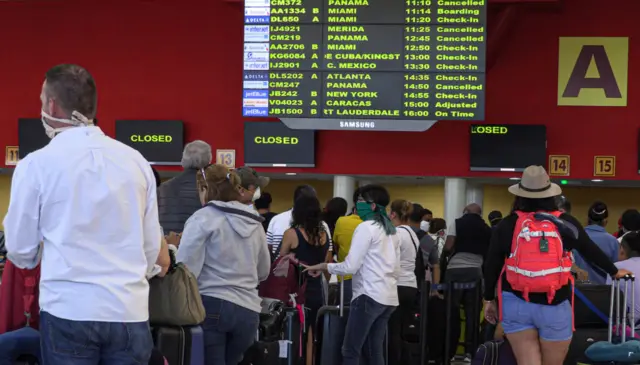 Image source, Getty Images
Image source, Getty ImagesHolidaymakers scrambled to get out of Cuba